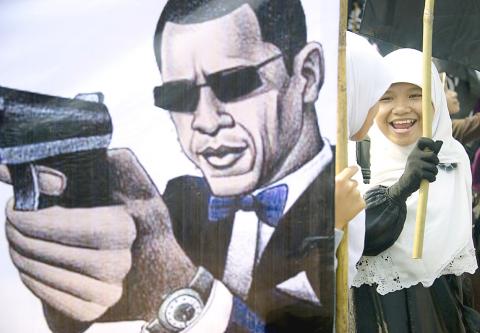US President Barack Obama called off plans to visit Asia and attend two summits because of the US government shutdown, raising questions about the strategic “pivot” to the region that he announced just two years ago.
Obama had planned to depart today for a four-nation, week-long trip. He canceled visits to Malaysia and the Philippines earlier this week because of his budget struggle in the US Congress and said on Thursday he would not attend the regional summits in Indonesia and Brunei.
The political standoff over the US budget has shut down non-essential government services and appeared likely to drag on for another week or longer. Another crisis looms in two weeks when lawmakers must decide whether to increase the US government’s US$16.7 trillion debt borrowing limit.

Photo: AFP
“The president made this decision based on the difficulty in moving forward with foreign travel in the face of a shutdown, and his determination to continue pressing his case that Republicans should immediately allow a vote to reopen the government,” the White House said.
Obama was scheduled to meet Russian President Vladimir Putin, Chinese President Xi Jinping (習近平) and Japanese Prime Minister Shinzo Abe, among other leaders.
Two of his main aims would have been to discuss the Syria crisis with Putin and to hold talks on a maritime code of conduct for disputed territories in the oil and gas-rich South China Sea.
“We are disappointed,” Indonesian Information Minister Tifatul Sembiring said on the island of Bali, host of the APEC summit starting tomorrow.
“I think the summit will go on, there is a long-term plan, [but] without Obama, you can imagine how disappointed we are. We could hardly imagine he wouldn’t come,” he said.
Obama was also scheduled to attend ASEAN’s East Asia Summit in Brunei next week.
Xi, who was on a visit to Malaysia yesterday, did not comment on Obama’s decision. However, analysts said the no-show by Obama would work to China’s advantage.
“While his decision is perfectly understandable, it projects a poor image of America as a country that is politically dysfunctional and on the verge of another economic crisis,” said Ian Storey, senior fellow at Singapore’s Institute of Southeast Asian Studies. “Meanwhile, cash-rich and self-confident China will have the floor to itself.”
Obama twice postponed visits to Indonesia and Australia in 2010, because of a health reform bill and then because of the Gulf of Mexico oil spill. He was absent from the APEC meeting last year in Vladivostok, Russia, because of a Democratic Party convention.
In Tokyo, Japan’s top government spokesman, Yoshihide Suga, said Abe would attend the summits as planned.
“This is a domestic problem of the United States,” he said. “We hope the [Obama] administration and Congress negotiate earnestly to solve the problem as early as possible, so that the problem won’t be affecting various issues.”

MAKING WAVES: China’s maritime militia could become a nontraditional threat in war, clogging up shipping lanes to prevent US or Japanese intervention, a report said About 1,900 Chinese ships flying flags of convenience and fishing vessels that participated in China’s military exercises around Taiwan last month and in January last year have been listed for monitoring, Coast Guard Administration (CGA) Deputy Director-General Hsieh Ching-chin (謝慶欽) said yesterday. Following amendments to the Commercial Port Act (商港法) and the Law of Ships (船舶法) last month, the CGA can designate possible berthing areas or deny ports of call for vessels suspected of loitering around areas where undersea cables can be accessed, Oceans Affairs Council Minister Kuan Bi-ling (管碧玲) said. The list of suspected ships, originally 300, had risen to about

DAREDEVIL: Honnold said it had always been a dream of his to climb Taipei 101, while a Netflix producer said the skyscraper was ‘a real icon of this country’ US climber Alex Honnold yesterday took on Taiwan’s tallest building, becoming the first person to scale Taipei 101 without a rope, harness or safety net. Hundreds of spectators gathered at the base of the 101-story skyscraper to watch Honnold, 40, embark on his daredevil feat, which was also broadcast live on Netflix. Dressed in a red T-shirt and yellow custom-made climbing shoes, Honnold swiftly moved up the southeast face of the glass and steel building. At one point, he stepped onto a platform midway up to wave down at fans and onlookers who were taking photos. People watching from inside

Japan’s strategic alliance with the US would collapse if Tokyo were to turn away from a conflict in Taiwan, Japanese Prime Minister Sanae Takaichi said yesterday, but distanced herself from previous comments that suggested a possible military response in such an event. Takaichi expressed her latest views on a nationally broadcast TV program late on Monday, where an opposition party leader criticized her for igniting tensions with China with the earlier remarks. Ties between Japan and China have sunk to the worst level in years after Takaichi said in November that a hypothetical Chinese attack on Taiwan could bring about a Japanese

The WHO ignored early COVID-19 warnings from Taiwan, US Deputy Secretary of Health and Human Services Jim O’Neill said on Friday, as part of justification for Washington withdrawing from the global health body. US Secretary of State Marco Rubio on Thursday said that the US was pulling out of the UN agency, as it failed to fulfill its responsibilities during the COVID-19 pandemic. The WHO “ignored early COVID warnings from Taiwan in 2019 by pretending Taiwan did not exist, O’Neill wrote on X on Friday, Taiwan time. “It ignored rigorous science and promoted lockdowns.” The US will “continue international coordination on infectious